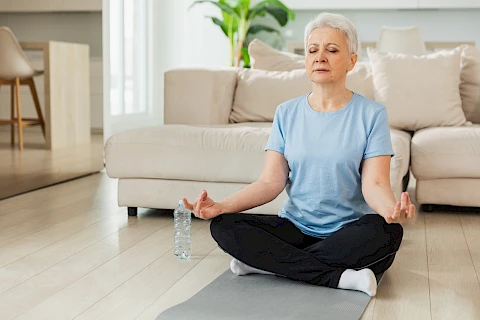
Parkinson's disease is a neurological disorder affecting movement. It often results in symptoms such as muscle stiffness, tremors, and issues with balance. For seniors, these challenges can make daily life more difficult and stressful. However, mindfulness practices offer a way to help manage these symptoms. Mindfulness is not a cure, but it can be a powerful tool for those living with Parkinson's. It helps reduce stress, improve focus, and enhance overall well-being.
What Mindfulness Means
Mindfulness refers to the practice of being present and fully engaged with the current moment, without being distracted or overwhelmed by what's around us. It involves focusing on one's thoughts, feelings, and sensations without judgment. This practice can bring about a sense of calm and clarity.
For seniors with Parkinson's, mindfulness can be particularly beneficial. It helps them connect with their bodies, recognize stressors, and respond more effectively to symptoms. Some benefits include reduced anxiety, better stress management, and improved emotional health.
Mindfulness Techniques for Seniors
Try some mindfulness techniques tailored for seniors with Parkinson's:
- Breathing Exercises: Focusing on your breathing is a simple yet effective way to promote relaxation. Seniors can start by sitting comfortably, closing their eyes, and taking deep, slow breaths. This helps calm the mind and relieve tension.
- Body Scan Meditation: This technique enhances body awareness and reduces tension. It involves mentally scanning each part of the body from head to toe, noticing any sensations or discomfort.
- Mindful Walking: Beneficial for those who can move, this practice combines gentle movement with mindfulness, helping improve focus and coordination. Walking slowly and paying attention to the rhythm of each step can foster a sense of peace and presence.
Managing Stress and Anxiety
Mindfulness is a proven method for reducing stress and anxiety. For seniors, incorporating mindfulness into daily routines can lead to a more relaxed and balanced life. Certain techniques, such as starting the day with a short meditation or ending it with deep breathing exercises, integrate mindfulness seamlessly into daily activities.
Real-life examples show that practicing mindfulness can significantly lower stress levels. Seniors have reported feeling calmer and better able to cope with the challenges of Parkinson's after regular mindfulness sessions.
Improving Focus and Cognitive Function
Mindfulness can also enhance concentration and mental clarity. This is helpful for seniors with Parkinson's, as the disease often impacts cognitive function. Exercises like focusing on a single task without distractions or practicing meditation that hones attention can boost brain function.
Caregivers should support these practices. They can encourage regular mindfulness sessions and help create a quiet, comfortable space for seniors to practice.
Enhancing Overall Well-Being
The benefits of mindfulness extend beyond mental health and touch on physical and emotional well-being. Seniors who practice mindfulness often experience better physical health, as reduced stress can lead to lower blood pressure. Emotionally, many seniors find greater joy and less depression.
Mindfulness can also encourage social interaction, especially if seniors join mindfulness groups. These communities provide support, friendship, and share the journey of mindfulness together. There are many success stories of seniors who feel empowered and better equipped to handle Parkinson's thanks to mindfulness.
Become More Mindful With the Help of Senior Helpers Charlotte
Mindfulness offers numerous benefits for seniors with Parkinson's, from reducing stress to enhancing overall well-being. If you're considering starting a mindfulness practice, there's no better time than today. Small steps can lead to significant benefits.
For those in Concord, Charlotte, and Pineville, Senior Helpers Charlotte is here to provide personalized support and resources. Contact us to learn more about how mindfulness can make a difference in the lives of seniors with Parkinson's.